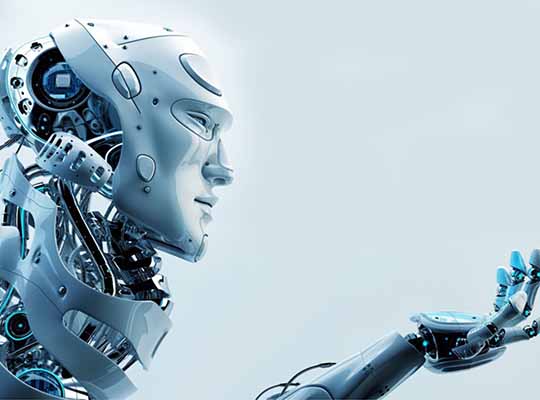The future of robotic process automation (RPA) is strong and will significantly impact working in the next few years. RPA adoption is well on track, leading the new way of working in 2025, and here are some key findings:
Robot to human contribution ratio- As per a World Economic Forum (WEF) report, currently, machines handle one-third of all work tasks. By 2025, this number will change drastically, and bots will take 50% of the total workload.
Increased RPA uptake- According to Gartner, spends on RPA is estimated to touch USD 2.4 billion in 2022. This means that 85% of larger organizations will aggressively deploy RPA in one way or the other to cut costs. So, this is coming, and it is an inevitable phenomenon.
Evolution from traditional technologies to automated models- Gartner states that by 2025, conventional computing technologies will hit a digital wall. This will make it imperative for enterprises to shift to newer models, incorporate automation, neuromorphic computing, and more. Professionals with these skills will experience better career opportunities.
Gartner also predicts that by 2024, one or more technology mega-vendors will either build or acquire targeted Hyper Automation technologies. Enterprises would need to unify diverse technological elements such as RPA, document understanding, process mining, and machine learning (ML) to optimize their business processes and deliver end-to-end automation.
A transformation in job descriptions and skills driven by RPA
RPA has progressed from its nascent stage and has shown signs of great potential. Unlike earlier, business process automation and IT and infra-related automation use cases are witnessing great demand due to RPA. RPA has taken automation to a whole new level. A McKinsey report highlighting ~60 percent of occupations could have over 30 percent of their constituent activities automated shows that learners should develop skills in RPA and automation to stay relevant. Employees will be freed from mundane activities and more involved in processes and tasks that require their expertise.
| Role | The impact that RPA is predicted to create | Recommended skills and learnings |
| Support Engineer | By 2025, the life of a support engineer at work will mostly revolve around: Monitoring and co-working alongside a bot and the activity will require over 50% of a support engineer’s timeTeaching and training the bot on how to work intelligentlyTaking up actions that will need human intervention when the bot is unable to complete an actionImplementing low-complexity bug fixes and change requests to RPA flows. | Scripting (.Net, VB, Java, Python, PowerShell, etc.)RPA developmentRPA support |
| Software / Application Developer | As low code-based application development platforms become popular, these dimensions to software development will create significant impact: Most changes that need application development after an application has been released to production will be fixed using RPA.Software developers will mostly focus on high-complexity code development.About 50% of application development code will be generated on low-code platforms.There will be high expectations from software developers to make high-complexity codes accessible and reusable.Software development will take a commoditized development angle which will de-couple complexity and effort in today’s world. | Low-code development platforms such as Appian, Visual LANSA, GeneXus, Zoho Creator, Creatio, and KiSSFLOW – BPM and Workflow SoftwareScripting skills to address limitations in low-code platforms and RPA |
| Project Manager | By 2025, the life of project managers is set to change drastically: They will be handling multiple projects and accounts in the ratio of 1:3Project managers can leverage their RPA learnings to perform tasks related to technical design and solution and look forward to building domain expertiseExpectations from project managers will increase and they will be expected to play techno-functional roles. | Design thinkingEmerging technologies and their benefitsAutomation courses or a master’s degree in automation |
Support engineers, for example, with IT and infrastructure support skills, will monitor bots and co-exist with them. They will have the opportunity to improve employee and customer support services through automation, bug fixes and change requests to RPA flows versus repetitive, mundane tasks that they carry out today. Constantly training and upgrading RPA bots will become an essential part of the job description.
Application support specialists with deep-rooted application knowledge will add RPA to their portfolio. With ~50% of application development code generated on low-code platforms, application support specialists will detect, analyze, and solve RPA platform-related issues. It will be a software developer’s responsibility to develop accessible and reusable high-complexity codes.
Project managers handling teams of support engineers or application support specialists will also witness a transformation in how they handle projects. They will be assigned multiple projects and accounts, leveraging their RPA skills and knowledge to execute techno-functional roles. They will need to ensure the upskilling of engineers in their teams so that they can work seamlessly with RPA bots.
Decision-makers should actively involve their teams in the RPA adoption journey. That way, they will be better positioned to adapt to changes that the introduction of digital humans brings along.
Hyper Automation and RPA – What skills should you acquire?
According to Gartner, the global Hyper Automation enabling software market will see double-digit growth through next year, reaching ~USD 600 billion. This will also impact the job market with greater opportunities for developers, support specialists, etc. Invoice processing, as an example, will be 80% automated — a no-brainer by 2025.
Insurance processing will be child’s play, and Engineers will worry about keeping the bot up to speed with digital transformation in Healthcare. Many roles will experience minimal human interaction. Administrators will be responsible for the performance of bots. They will be making changes as well as applying bug fixes, and code fixes to bots.
IT development and testing engineers, IT support engineers, and CIOs will need to look at upskilling in such a scenario. New opportunities will be created in various areas, including SAP, Salesforce, and Microsoft Dynamics, with RPA as an essential element of the new role. Scripting technologies can complement RPA skills and prepare engineers for future necessities.
Hyper Automation has enabled organizations to leverage process-agnostic technologies such as RPA, artificial intelligence (AI), and low-code application platforms (LCAP) to identify, evaluate, and automate processes at scale.
Due to the rising popularity of Hyper Automation, Gartner says, through 2024, enterprises will adopt at least three types of software that will help them achieve Hyper Automation. This makes it imperative for IT employees to be adept at technologies that support Hyper Automation – AI, ML, process discovery and mining, chatbots, and conversational AI. Gartner also states that by 2025, 50% of enterprises will have devised AI orchestration platforms to operationalize AI and 70% of new custom applications that enterprises build will either use low-code or no-code technologies under the umbrella of Hyper Automation. This makes it essential to have strong AI skills:
- Python scripting and ability to write algorithms
- Skills to develop conversational chatbots
- Omnichannel integration (WhatsApp, Facebook, Slack, Telegram, etc.) to these chatbots
- Development of intelligent APIs to solve problems related to conversational AI
By 2025, IT engineers will need to be well-versed with chatbot technologies such as ServiceNow, Microsoft Power Virtual Agents, Rasa, and Azure Bot Service. Additionally, proficiency and experience in at least one scripting language such as VB, Java, .Net, and Python can offer individuals a competitive edge over others with only RPA knowledge or scripting experience.
There are quite a few universities that offer courses in automation:
- Competing in the Age of AI from Harvard Business School Master in Analytics and Management from London Business School
- Advanced Program in Artificial Intelligence-Powered Marketing from Indian Institute of Management
In a poll of business and IT stakeholders conducted by Gartner amidst the pandemic in September 2020, 75% of respondents said they would continue or start new AI investments in the next six to nine months. This scenario signals the opening of new job avenues and opportunities for reorienting career paths. So, it is the best time to learn new convergence technologies.
The next steps
According to Gartner, Hyper Automation principles form the foundation of the future of work, the catalysts to accelerate digital initiatives.
Forrester estimates the market for robots in knowledge-work processes to reach USD 2.9 billion this year, and Gartner predicts the RPA solutions market to reach USD 2.4 billion by next year. RPA solutions are a must for organizations struggling to gain greater control over their processes and better insight into their business goals. They help promote a healthy working environment. While robots can help bring outdated applications, systems, and technologies back on track, they can also boost processes and IT infrastructure functioning effectively by making them more user-friendly.
As technologies disrupt everyday operations and optimize processes to make them more powerful, business leaders and decision-makers should also look for ways to encourage change across the organization. They should promote innovation at work and consciously implement programs that help their workforce enhance their skills. Business leaders and decision-makers should encourage a culture of automation within the organization to be prepared for the future. Developers, programmers, quality assurance specialists, testing specialists, and analysts should upskill, taking up certifications in the areas of AI, ML, and scripting languages such as .Net, Java, and Python. They must imbibe a “never stop learning” attitude, and that will help them power their journeys and career growth.















